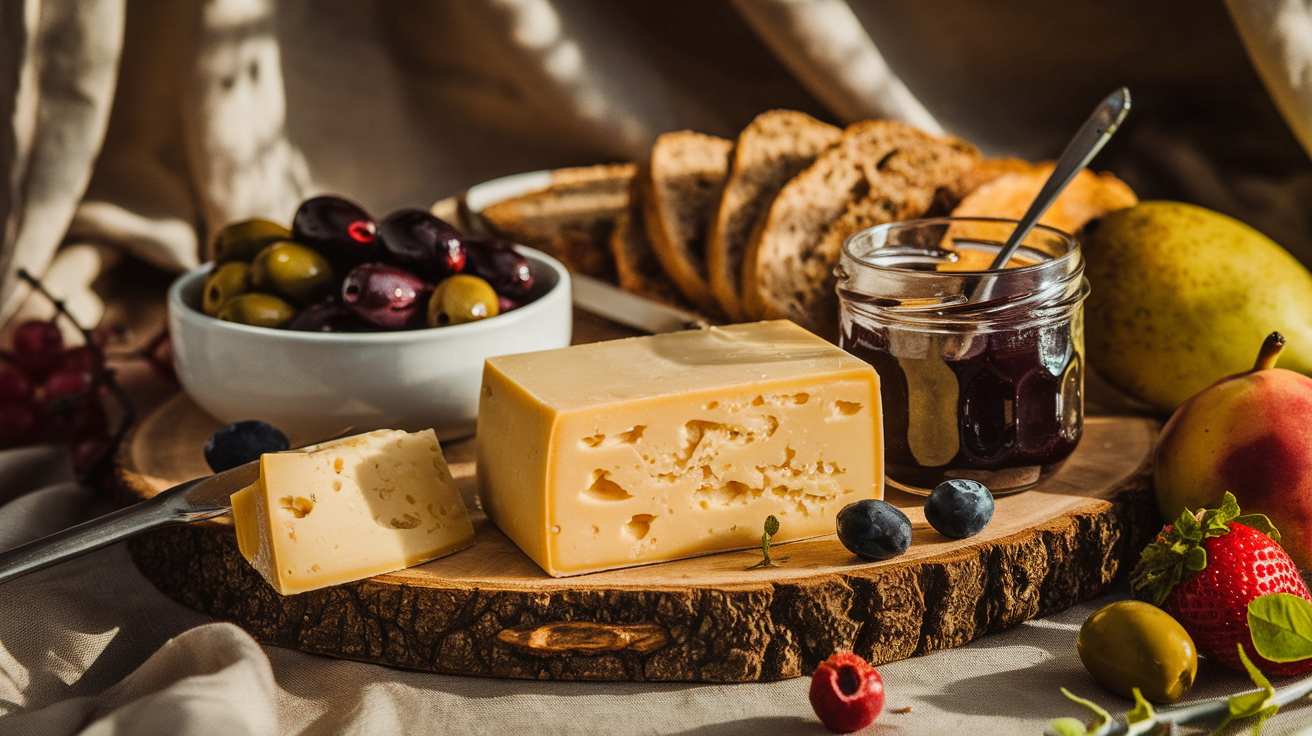Introduction to Dairy-Free Cheese
In recent years, the demand for vegan alternatives to traditional dairy products has skyrocketed. Vegan cheese, in particular, has become a staple in the diets of those who are lactose intolerant, following a plant-based lifestyle, or simply looking to reduce their intake of animal products. But what exactly is vegan , and why has it gained such popularity?
Vegan cheese is a dairy-free alternative made from plant-based ingredients like nuts, seeds, and legumes. Unlike traditional cheese, which is made from milk, vegan cheese avoids animal products altogether, making it suitable for vegans and those with dairy allergies. The texture, flavor, and melting properties of vegan cheese can vary widely, offering a broad range of options for different culinary needs.
The Rise of Plant-Based Cheese: A Cultural Shift
The increasing popularity of vegan is part of a broader cultural shift towards plant-based eating. This shift is driven by several factors, including concerns about animal welfare, the environmental impact of dairy farming, and the health benefits of a plant-based diet.
Historically, vegan was often viewed as an inferior substitute for real cheese, with many early versions criticized for their poor texture and lack of flavor. However, advances in food technology and a growing market for vegan products have led to significant improvements in the quality of vegan cheese. Today, it’s not uncommon to find vegan cheeses that rival their dairy counterparts in taste and texture.
The Science Behind Vegan Cheese
Is made using a variety of plant-based ingredients, each contributing different properties to the final product. Common ingredients include:
- Nuts (especially cashews and almonds): These provide a creamy base and rich flavor.
- Coconut oil: Used for its fat content, which mimics the richness of dairy cheese.
- Nutritional yeast: Adds a cheesy, umami flavor that’s often missing in plant-based dishes.
- Tapioca starch and agar-agar: Help achieve a stretchy, meltable texture.
The process of making vegan cheese involves blending these ingredients and fermenting them with the help of bacterial cultures, similar to the process used for dairy cheese. Fermentation is key to developing the complex flavors that make vegan cheese so satisfying.
Different Types of Dairy-Free Cheese
Just like dairy cheese, vegan cheese comes in a wide variety of types and flavors, each suited to different uses. Here’s a breakdown of the most popular types of vegan :
1. Soft Plant-Based Cheese
Soft vegan cheeses are creamy and spreadable, perfect for spreading on crackers or using as a dip. Common varieties include:
- Cashew Cheese: Made from soaked and blended cashews, this cheese has a rich, buttery flavor.
- Almond Ricotta: A fluffy, mild cheese made from almonds, often used in lasagna and other Italian dishes.
- Herbed Cream Cheese: A tangy, herb-infused cheese perfect for bagels.
2. Semi-Hard Dairy-Free Cheese
These cheeses are firmer and can be sliced or shredded. They are great for sandwiches, pizza, or charcuterie boards. Examples include:
- Cheddar Style: A sharp, tangy cheese made from a blend of nuts and nutritional yeast.
- Mozzarella Style: Soft and stretchy, this cheese is ideal for melting on pizza or in a caprese salad.
3. Hard Plant-Based Cheese
Hard vegan cheeses are aged longer and have a firmer texture, making them suitable for grating over pasta or shaving onto salads. Varieties include:
- Parmesan Style: A sharp, salty cheese made from a base of nuts and seeds.
- Aged Gouda Style: A rich, smoky cheese with a firm texture.
How to Make Your Own Dairy-Free Cheese at Home

Making at home is a rewarding process that allows you to customize the flavor and texture to your liking. Here’s a basic recipe for cashew-based vegan cheese:
Ingredients:
- 1 cup raw cashews (soaked overnight)
- 2 tablespoons nutritional yeast
- 1 tablespoon lemon juice
- 1 garlic clove
- 1/2 teaspoon sea salt
- 1/4 cup water (more if needed)
- 1 tablespoon agar-agar powder (optional, for firmer texture)
Instructions:
- Drain and rinse the soaked cashews.
- In a food processor, combine the cashews, nutritional yeast, lemon juice, garlic, and sea salt. Blend until smooth, adding water gradually until you reach the desired consistency.
- If you prefer a firmer cheese, dissolve the agar-agar powder in water, bring to a boil, and then mix it into the cashew mixture.
- Pour the mixture into a mold and refrigerate for at least 2 hours to set.
- Enjoy your homemade vegan on crackers, in sandwiches, or as part of a vegan charcuterie board.
Benefits of Plant-Based Cheese
Offers several benefits over traditional dairy cheese, making it an attractive option for many people. Here are some key advantages:
1. Health Benefits
Is typically lower in saturated fat and calories compared to dairy cheese. It’s also free from cholesterol, which is only found in animal products. Many vegan cheeses are rich in heart-healthy fats from nuts and seeds, and they often contain added nutrients like B12, which is important for vegans.
2. Environmentally Friendly
The production of vegan cheese has a significantly lower environmental impact than dairy cheese. Dairy farming is resource-intensive, requiring large amounts of water, feed, and land. It also contributes to greenhouse gas emissions. In contrast, plant-based cheese production uses fewer resources and generates less pollution.
3. Ethical Considerations
For those concerned about animal welfare, vegan cheese offers a cruelty-free alternative. Traditional dairy production involves the exploitation of cows, including practices like forced impregnation and the separation of calves from their mothers. Choosing vegan cheese eliminates the need for these practices.
Pairing Dairy-Free Cheese with Wine and Food

Just like dairy cheese, vegan cheese can be paired with a variety of wines and foods to enhance its flavors. Here are some tips for pairing vegan cheese:
- Red Wine: Bold, tannic red wines like Cabernet Sauvignon pair well with aged, hard vegan cheeses that have a strong, nutty flavor.
- White Wine: Light, crisp white wines like Sauvignon Blanc complement soft, creamy vegan cheeses, especially those with a hint of acidity.
- Sparkling Wine: Sparkling wines like Champagne are excellent with rich, buttery vegan cheeses, as the bubbles help to cut through the creaminess.
- Fruits and Nuts: Pair vegan cheese with fresh fruits like grapes, figs, and apples, as well as nuts like almonds and walnuts, for a balanced and satisfying snack.
- Crackers and Bread: Choose whole-grain or seeded crackers and artisanal breads to complement the flavors of your vegan cheese.
Storing and Preserving Plant-Based Cheese
Proper storage is key to maintaining the freshness and flavor of vegan cheese. Here are some tips on how to store your vegan :
- Refrigeration: Most vegan cheeses should be stored in the refrigerator, wrapped tightly in wax paper or plastic wrap to prevent drying out. They can last for up to two weeks in the fridge.
- Freezing: Some vegan cheeses, particularly hard varieties, can be frozen for up to three months. Thaw them in the refrigerator before use, as freezing may slightly alter the texture.
- Avoid Cross-Contamination: If you’re storing vegan cheese alongside dairy cheese, keep them in separate containers to avoid cross-contamination.
Frequently Asked Questions
1. Can dairy-free cheese melt like traditional cheese?
Yes, many vegan cheeses are designed to melt just like dairy cheese. However, the melting properties can vary depending on the ingredients used. For the best melting results, look for vegan cheeses made with coconut oil or tapioca starch, as these ingredients help mimic the stretchiness and meltability of dairy cheese.
2. Is plant-based cheese healthy?
Vegan can be a healthy alternative to dairy cheese, especially when made from whole-food ingredients like nuts and seeds. It’s generally lower in saturated fat and calories, and free from cholesterol. However, some processed vegan cheeses can be high in sodium and contain added oils, so it’s important to read labels and choose options with minimal additives.
3. Can I make dairy-free cheese at home?
Absolutely! Making vegan at home is not only possible but also allows you to customize the flavor, texture, and ingredients to suit your preferences. With simple ingredients like cashews, nutritional yeast, and lemon juice, you can create a delicious and healthy vegan in your own kitchen.
4. What are the best store-bought dairy-free cheeses?
There are many excellent store-bought vegan cheeses available today, each offering different flavors and textures. Some popular brands include Miyoko’s Creamery, Kite Hill, and Violife. These brands offer a range of vegan cheeses, from soft cream cheeses to aged, hard cheeses, providing plenty of options for every taste and culinary need.
Conclusion
Vegan cheese has come a long way from its early days as a niche product with limited appeal. Today, it’s a versatile and delicious alternative to dairy cheese that can be enjoyed by vegans and non-vegans alike. Whether you’re looking to make your own vegan cheese at home or explore the many options available in stores, there’s never been a better time to embrace this plant-based delight. With its health benefits, environmental advantages, and ethical considerations, vegan cheese is more than just a substitute—it’s a new way to enjoy one of the world’s favorite foods.


